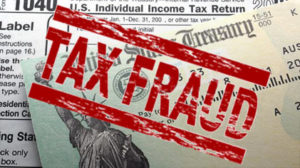
Tax time sees too many citizens left vulnerable to identity theft. Don’t be one of them. Follow these 6 steps to help reduce your risk of being a victim of Tax Fraud. Keep reading for 6 Simple Ways to Help Reduce Your Tax Fraud Risk. The scammers are out during our annual tax season. All the amazing tax planning guidance in the world can be undone by fraudsters.
By David Rae Certified Financial Planner™, Accredited Investment Fiduciary™
While you may have read of a sharp drop in tax-identity theft cases, all it takes is to get your own records and accounts hijacked once to thoroughly upend your life, ruin your credit and destroy your peace of mind for years to come. Unfortunately, our new hackable universe means we must always guard our personal information zealously and this is especially true at tax time.
A bit of proactive vigilance on your part can help reduce the odds of a tax-related nightmare later.
Tax Refund Theft
So how does the crime of tax refund theft or tax refund fraud actually work? It can occur when a criminal somehow steals your personal information and uses it to file a return in your name or someone else’s name, then claim and receive a large bogus tax refund at an address that is not yours. They receive this money whether or not you, the actual taxpayer, were due a refund or not.
Most taxpayers don’t realize they are tax fraud victims until they try and file their own tax returns and a computer rejects them. Fixing this type of fraud can take months and is costly, complicated, frustrating, stressful and time-consuming. And for those who are desperately waiting for their tax refund to come in, well, you won’t be making your kid’s college payment or going away on vacation any time soon.
Here are 6 tips to proactively protect yourself from tax time fraudsters:
-
Get organized and push your tax preparer to file early.
If you’ve filed sooner than later it will be harder for cyber thieves to file a fraudulent return in your name. Filing earlier should also mean you get your tax refund faster and if you’ve already received your refund, it will be hard to steal.
-
Adjust your withholdings to get a lower tax refund.
Nobody wants to pay more taxes than they owe. With the average tax refund in the $3100 range*, you may end up with quite a bit of money tied up for a long time if you are the unfortunate victim of tax fraud. But even if you aren’t a victim and you’re paying too much into the system, you are still giving the government an interest-free loan. The solution is to adjust your withholdings to get a lower refund.
-
Be strong and diligent with your passwords.
Protect your passwords and don’t use the same one for every site. And for goodness sake, don’t be lazy when creating them either. Your birthday or those of your kids are not good passwords. Password1234 is not a good password. Mix up letters, numbers, upper and lower case, and symbols. Whatever you do, do not store your passwords on your phone or computer but on a USB that you keep in a secure place. If you need the list for reference, print it out but hide it from prying eyes.
-
Keep your cyber security healthy and updated.
Be careful where and when you give out personal information like your date of birth and your social security number. Shred paperwork that contains your personal information. Avoid unsecured Wi-Fi, and for the love of god, don’t prepare and file your tax returns on a public computer or on public Wi-Fi. Make sure your anti-virus programs are up to date and back up your computer regularly.
-
Beware of ‘calls’ or email ‘contact’ from the IRS.
The IRS will not call, email or text you out of the blue. If you receive a phone call claiming to be the IRS hang up!!!! (IT IS NOT THEM) Online, be aware that many people are phishing to get your personal info. Don’t click on links that appear to be from your tax prep firm unless you know it is actually from them. If you are uncertain, ask for a name and call-back number for verification or go to their site directly before logging in.
-
Act quickly if you think you may be a victim of Tax Fraud.
If you think you may have been defrauded, the IRS has laid out steps to take on their site IRS.GOV. It also included links to the state agencies that you will also want to inform of the potential fraud as well. Fraudsters may just attack you on a state or federal return or both. Brace yourself, complex fraud cases can easily take 180 days to resolve.
If you have an idea of where your information was compromised ask for their help to resolve the issue. This could be your tax preparer, employer or even another firm. In many states, firms are required to notify you if your information has been compromised. Tax fraud can be ridiculously complicated to clear on your own so if you find yourself over your head, by all means, seek professional guidance to clear it up.
So along with death and taxes, fraud has taken a seat at the table of things that will never go away. As long as there is money, there will always be nefarious characters – blue collar, white collar, and no collar, all – that will try and steal what isn’t theirs. But at least in the case of tax fraud, a little proactive safeguarding can go a long way in protecting yourself and your own.
You May also like:
6 Ways to Slash Your Taxes at Year End
How Does California Tax Your Capital Gains?
How Much Can A Cash Balance Plan Save Business Owners On Their Taxes?
Update: IRS Scam Alert
Tax Season is coming and we’ve got a new batch of IRS scams aimed at stealing your tax refund before you even know you are owed one. In just the past few days, the number of potential tax fraud victims has skyrocketed from just a few hundred to several thousand, according to the IRS. This year 2021, scammers are posing as IRS agents. If you get a call from a strange number demanding you return your refund money — or claiming you’re guilty of fraud — hang up. Then, report it to the Treasury Inspector General for Tax Administration (TIGTA) at 1-800-366-4484 or at TIGTA.gov.
Additionally, if you received a direct deposit into your account that you didn’t expect — without filing your taxes first — you can almost bet it’s been put there by scammers. They plan to take it off your hands later by calling you to demand it back. Or they may just be testing their access to your bank accounts. Alert your bank, and consider shutting down that account right away.
If you received a paper check for a tax refund that you also didn’t expect, write “VOID” on the check, and return it to the same regional IRS service center that the check came from immediately. And finally, if you go ahead and accidentally cash that fraudulent refund, the IRS suggests that you send a personal check to your local IRS service center with a note saying it’s repayment for an erroneous refund. Don’t forget to let them know you were a victim of a scam.
Live for Today, Plan for Tomorrow.
DAVID RAE, CFP®, AIF® is a Los Angeles financial planner with DRM Wealth Management. A regular contributor to Advocate Magazine, Huffington Post, and Investopedia not to mention numerous TV appearances. He helps smart people across the USA get on track for their financial goals. For more information visit his website at www.davidraefp.com

Unusual Tax Strategies To Do Now to Save on Your Taxes
The opinions voiced in this article are for general information only and are not intended to provide specific advice or recommendations for any individual. This does not constitute an endorsement. Talk to your fiduciary fee-only financial planner to help guide your financial decisions.











[…] Related: 6 Ways to Reduce Your Tax Fraud Risk […]